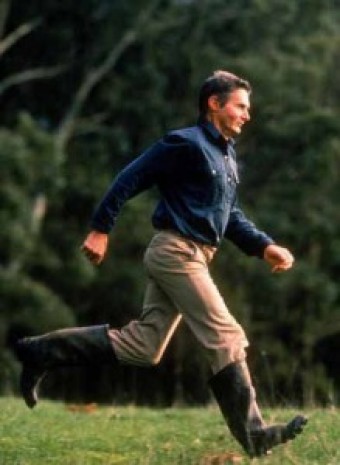
When she visits on the weekends, my niece goes to the gym with me. [Yes, I still call it that, rather than "health club", "sports club" or any of the other terms that are probably more precise and certainly more contemporary. In my earlier life, before the advent of the health club craze, I would attend either "the Y", which had a pool but no true weight room, or "the gym", which was Rocky Graziano's on West 25th St., which had a weight room but no true pool, unless you counted the accumulated rain water on the building's roof. While my current gym has a pool, it is certainly way beyond what our small YMCA had in the 1960's. But, I digress.]
Because of her interest in marathons, I've come to know something of that very particular world of athletic pursuit. Mostly, it's because I get stung with her bills for running shoes, portable running computers, and some God-awful muck called Gu that marathoners "eat" while in the midst of a race.
This lead me to learn that there is a type of footrace that originated in Australia called the "ultra-marathon". As it sounds, ultra-marathons cover over 550 miles of rough terrain for, well, for however many days or weeks it takes for the contestants to finish. If they do. It's the rough equivalent of 21 combined marathons.
Naturally, this pursuit attracts every sort of extreme sportsman or sportswoman, including, I'm sure, the standard collection of nutters, who desire to prove something by completing this grueling trial. They are fit, trim, and appropriately muscled. If you saw them, there would be no mistaking an ultra-marathoner for one of the usual gym rats.
Well, except for one, who was originally thought to be just another nutter. And why not, considering that he had never competed in even a standard marathon, was already past his 60th birthday, was a farmer from the middle of nowhere, showed up to run in gardening boots, and was in rather desperate need of dental prosthesis?
Oh, he had arthritis in his legs, too.

Apparently, in order to be a successful farmer from the middle of Nowhere, Australia, where vehicles cannot handle the terrain, one needs to be able to herd the sheep on foot, mainly by chasing after them. For days on end. Hence, Cliff Young figured a race like this wouldn't be any different than what he had been doing on the farm his entire life. Well, except for the chasing sheep part.
You can maybe guess the rest. At the start of the race all of the ultra-marathoners took off leaving Cliff the Nutter in their considerable wake. After 17 hours, the runners retired for the evening. The next morning, much to their surprise, Cliff Young was in the lead. Perhaps I should have mentioned that when Young was herding his sheep, it was not unusual for him to run all over his 2000 acres for days at a time without stopping to sleep or eat. Is there an adjective more extreme than "extreme"?
To make a long story short, Young won the race. In fact, he broke the record by two whole days. When he was presented with the prize check, he revealed that he hadn't realized that there was money involved. He just did it for a lark. In a moment of pure Australian-ness, he divided the prize money between the other contestants, as he felt they had worked just as hard as he had. That's right, LeBron, this is what grown-ups do.
He would set six more long-distance running records before his career ended. He would also compete again in the Ultramarathon when in his 79th year, while battling cancer. He finished the race, of course.
I should add that along the way he changed the running style of long-distance runners. Suddenly, every extreme athlete in the world was running like a mildly deranged Aussie farmer. It turns out that physiologists realized that Young's natural running style was the most efficient for that type of foot-racing.
He died in 2003 at the age of 81. All of the prize money that he had won over the years he gave to charities or friends and family in need.